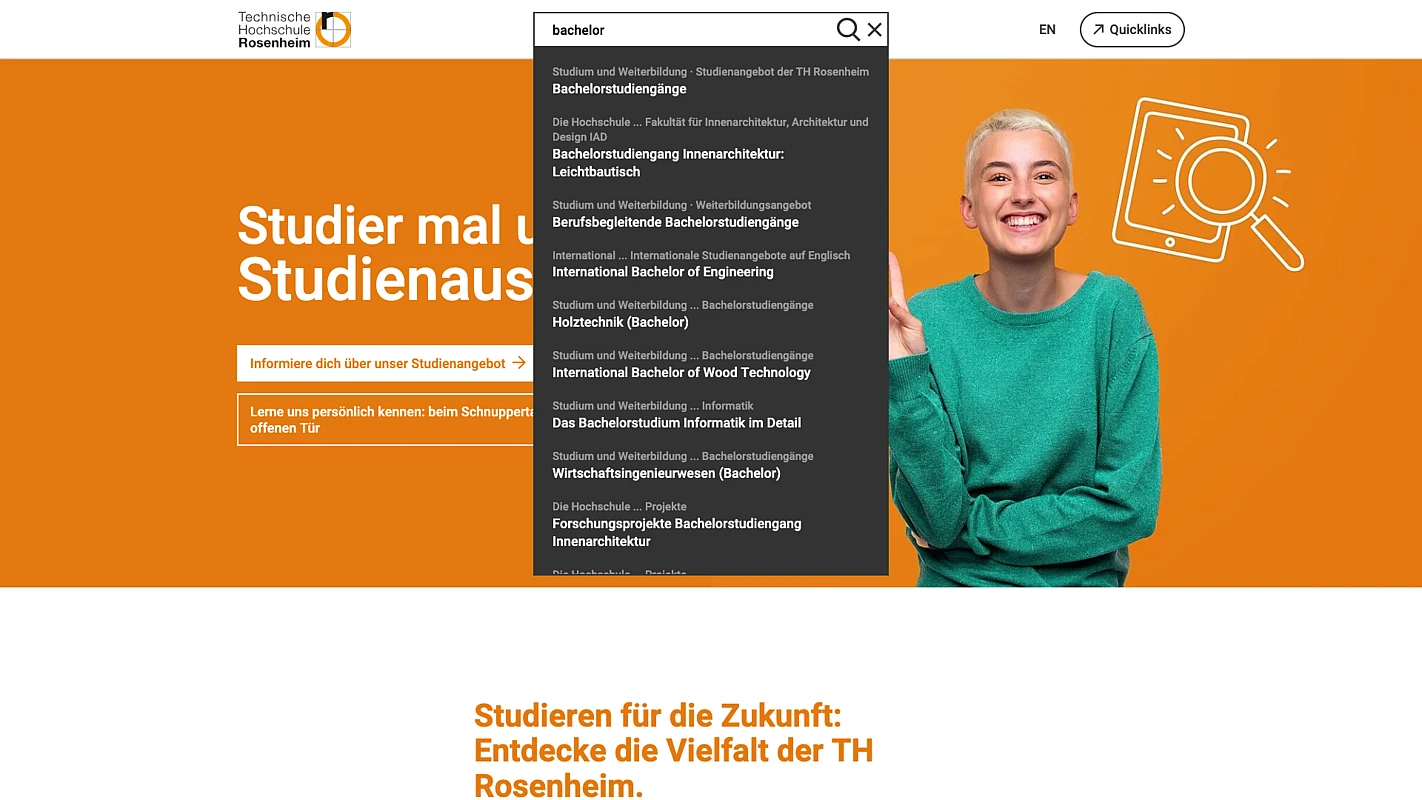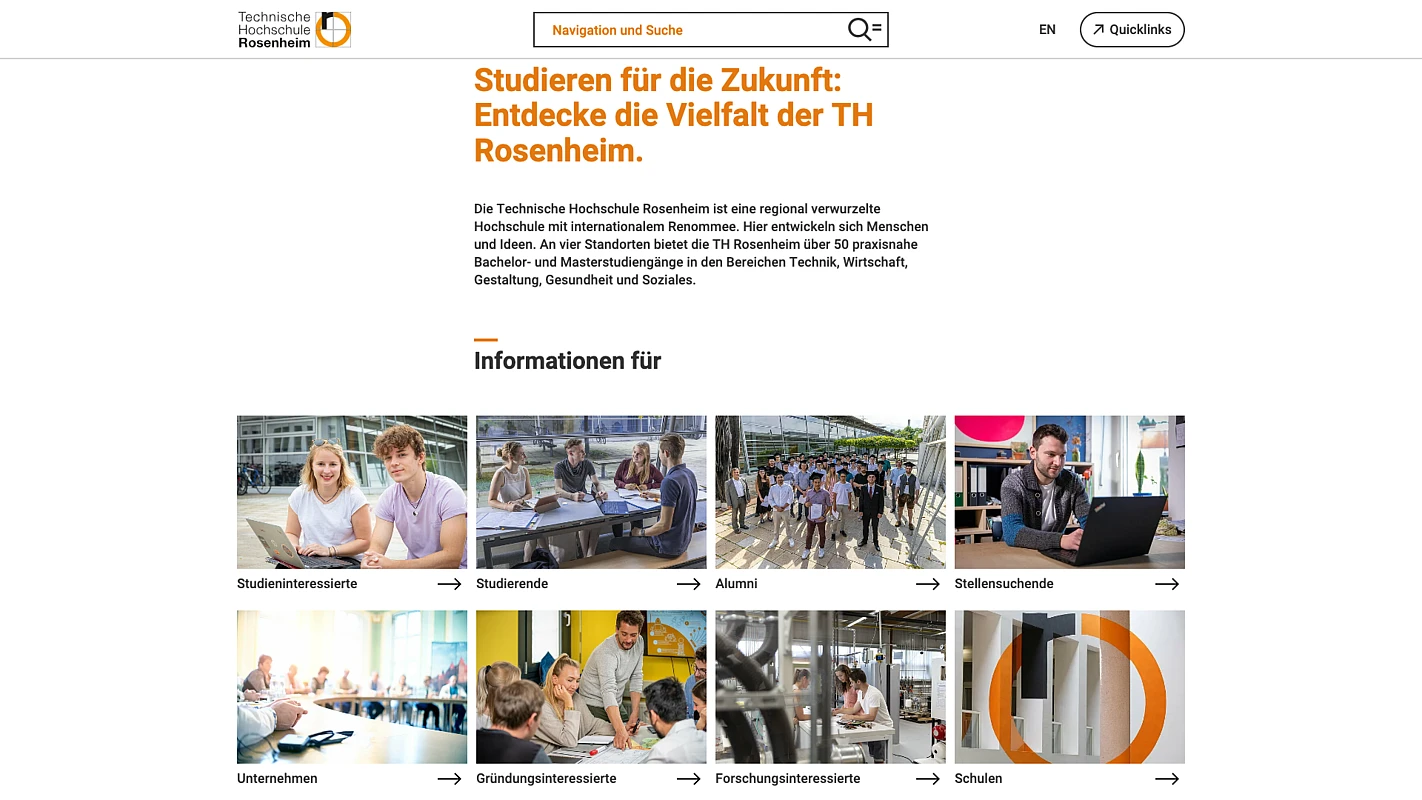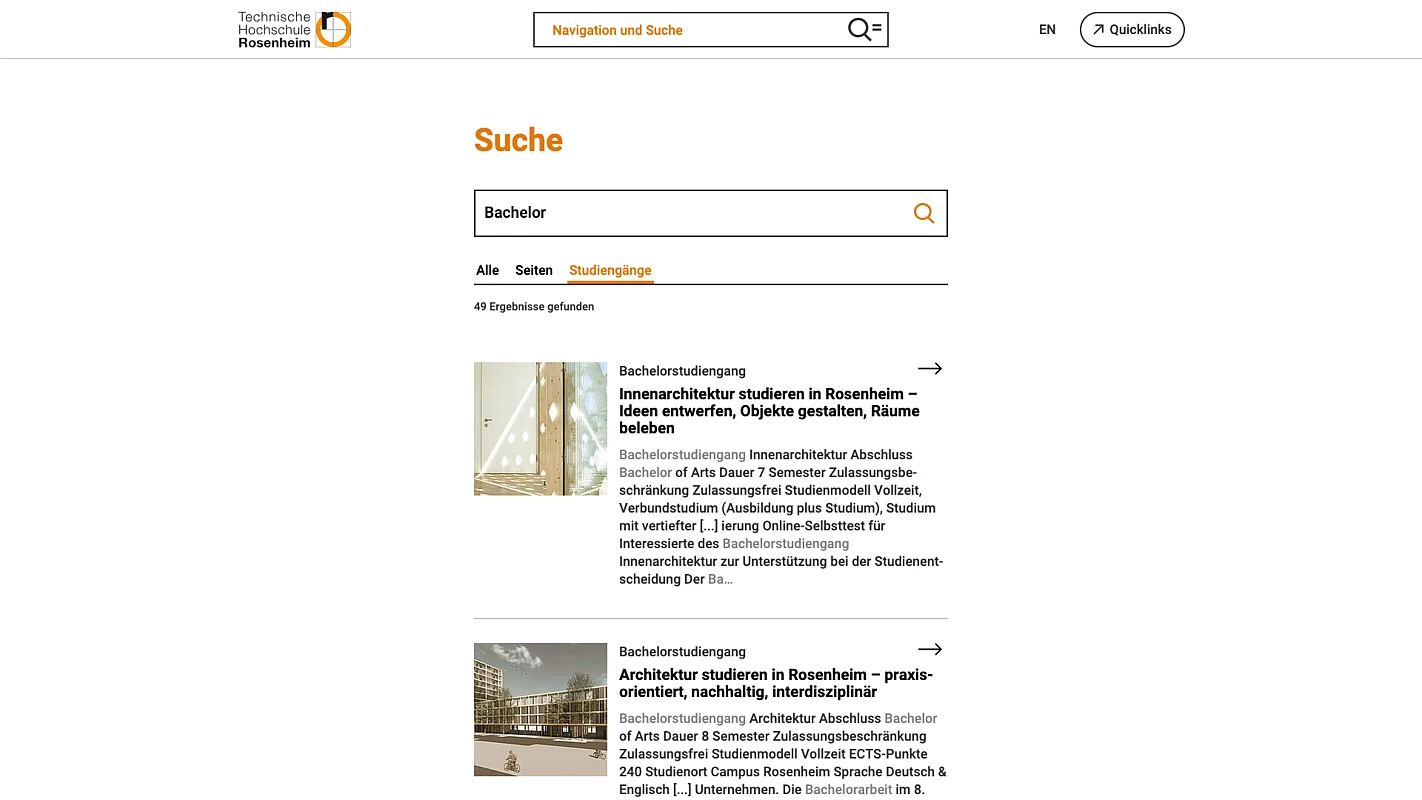TYPO3 Transforms Higher Education Website for User-Centricity and Accessibility
queo sets a new standard for the sector
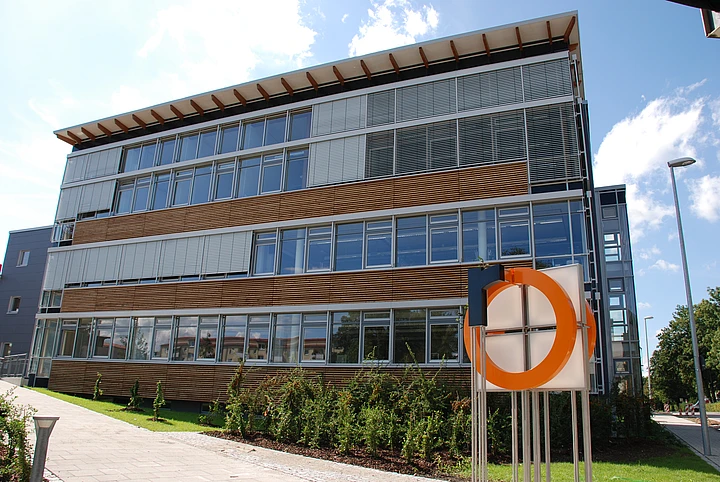
In this story
- Improved Navigation To Reach Desired Information Faster
- Accessibility and Mobile-First Design Take Center Stage
- Tailored Backend Features Streamline Content Management
- Real-time import of personal data
- Application deadline management
- Central management of study and examination regulations
- Empowering Higher Education with TYPO3 Collaborations
- Gallery & Features
- Behind the project
Are you interested in learning how to reshape your organization's digital presence with TYPO3?
I'm interestedThree clicks to every piece of information – this ambitious goal drove the digital transformation of Rosenheim Technical University of Applied Sciences (TH Rosenheim). Situated in a picturesque region of Germany, the higher education institution embarked on a mission to modernize its website and make it more accessible to its stakeholders.
Recognizing the project’s complexity, TH Rosenheim conducted a thorough public tender process to find a partner with the necessary expertise and resources. After diligent research and a competitive selection process, queonext emerged as the top contender. Their compelling proposal, portfolio of university website projects, and deep understanding of the higher education sector set them apart.
While many universities share similar requirements for their websites, each institution has its unique focus, vision, and features that set it apart. queonext recognizes this and looks to create tailored solutions that cater to each university’s specific needs.
In the case of TH Rosenheim, queonext turned to TYPO3 to develop a customized platform. TYPO3 was well-equipped to meet TH Rosenheim’s exacting standards for accessibility, responsiveness, and long-term scalability.
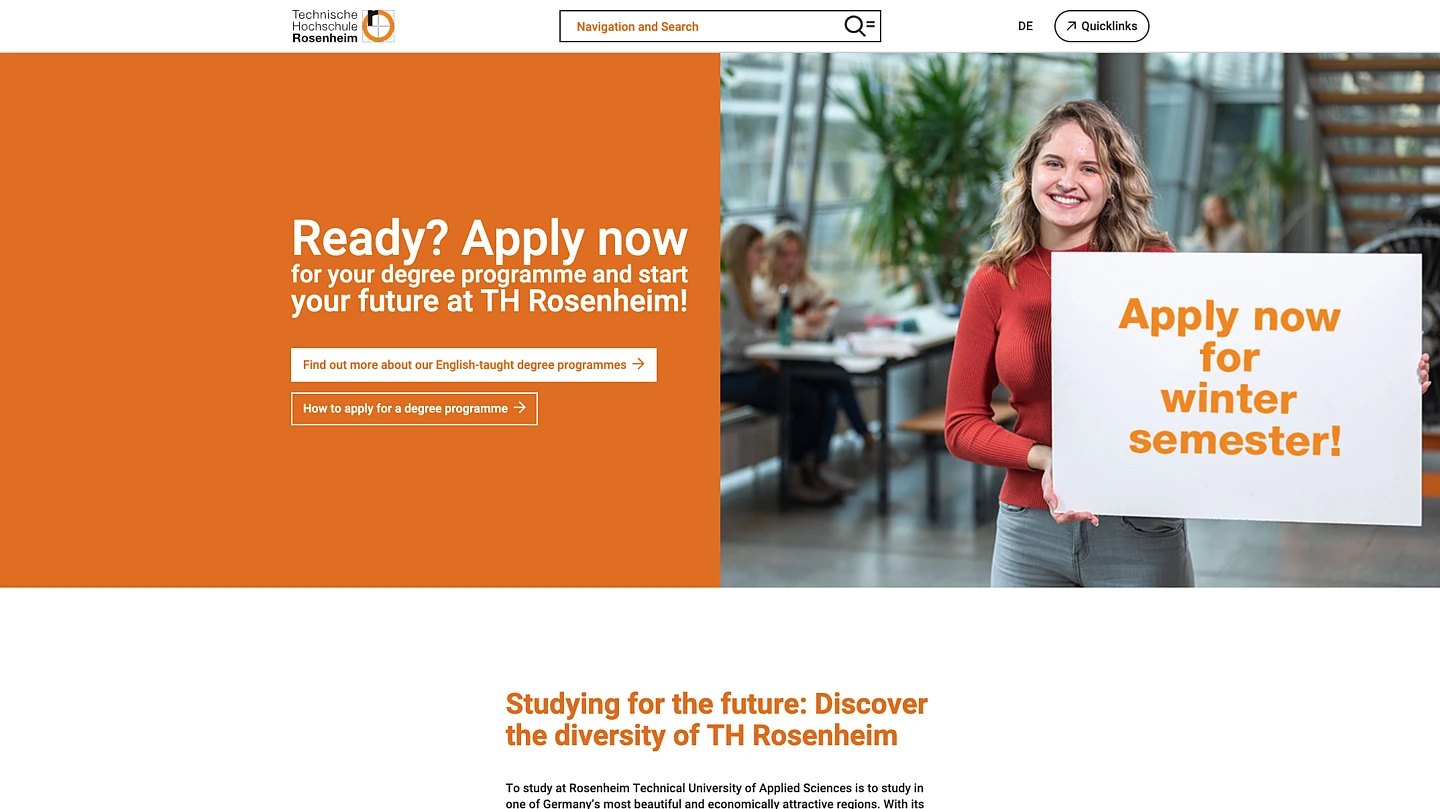
Improved Navigation To Reach Desired Information Faster
One of the standout features of TH Rosenheim’s new website is its innovative navigation concept. By combining a search bar and menu on the homepage, powered by the Solr Search Engine, users can quickly find the information they need among the university’s nearly 4,000 active pages. This intuitive approach eliminates the need for complex mega-menus, making it easier for visitors to navigate the site and access relevant content.
The website’s clear structure, concise text sections, and optimized typography further contribute to an engaging user experience. By focusing on target groups rather than organizational hierarchy, the content is more accessible and relevant to the needs of students, faculty, and other key audiences.
Accessibility and Mobile-First Design Take Center Stage
Accessibility is a fundamental principle for TH Rosenheim, and this commitment extends to their digital offerings. Just as their campuses cater to all users and abilities, their website had to be equally accessible to both future and prospective students. To achieve this, TH Rosenheim’s new website prioritizes accessibility, ensuring that every user, including those with disabilities, can easily access and navigate the platform.
queonext’s developers were tasked with bringing this vision to life. They integrated essential accessibility features from the outset, optimizing the site for screen readers and adhering to the highest web accessibility standards.
TH Rosenheim recognizes the importance of mobile devices for students, and so the website was built with a mobile-first approach. The responsive design ensures that the platform is fully accessible and user-friendly across all devices, from smartphones to desktop computers. This mobile-first strategy allows students to access critical information and resources on the go, enhancing their overall experience with the university.
“With the relaunch, our aim was to create a modern website that closely aligns with the needs of prospective and current students. It was important to us that desired content is easily accessible. This was achieved through the innovative menu including a search function. The optimal usability on mobile devices is highly valued by the students.”
– Janine Jess, Team Leader, University Communications, TH Rosenheim and Product Owner Relaunch
Tailored Backend Features Streamline Content Management
Behind the scenes, TYPO3 CMS powers TH Rosenheim’s website, providing a robust and flexible platform for content management. queonext’s team developed custom backend features tailored to the university’s specific needs, streamlining the content creation and updating process for web editors.
To manage content such as application deadlines, study plans, and contact information, a central administration tool was implemented. This feature ensures that critical information only needs to be updated in one place, saving time and reducing the risk of inconsistencies across the site.
These features demonstrate how seasoned experts like queonext can use the versatility of TYPO3 to create bespoke solutions for higher education institutions.
“We have also incorporated features for our numerous web editors, making content maintenance easier. This ensures that content, such as application deadlines for programs, study plans, or contact information for representatives, only needs to be maintained centrally and not repeatedly in a manual manner,” Jess explained.
Empowering Higher Education with TYPO3 Collaborations
queonext worked cooperatively with TH Rosenheim throughout the project. Regular workshops, remote sessions, and an agile development process ensured that the final product closely aligned with the university’s vision and requirements. Not only that, the website was one of five nominees for the TYPO3 Award 2023 in the category of “Education”.
“During the development and refinement of features, the expertise of the whole queonext agency team was a significant asset. This proficiency allowed ideas and requirements from the university members to be effectively implemented. The cooperation was very cooperative and based on trust. The team at queonext contributed a lot of good ideas and proactively suggested optimisation of our requirements,” Jess explained.
TYPO3’s extensive library of extensions and robust community support allows the creation of innovative, user-focused websites that streamline content management and enhance the overall user experience. The open-source nature of TYPO3 ensures that websites built on this platform can evolve and adapt to the changing needs of higher education institutions.
Explore more success stories and case studies to discover how institutions worldwide have harnessed TYPO3 to create outstanding digital experiences.
Gallery & Features
Behind the project
The partner who made this TYPO3 project possible.
queonext
We are both communication agency and service provider for software development. 150 queos at five locations design and implement brand communication and campaigns, websites and portals as well as individual software solutions. By combining communication and technology, we develop interlocking solutions.
